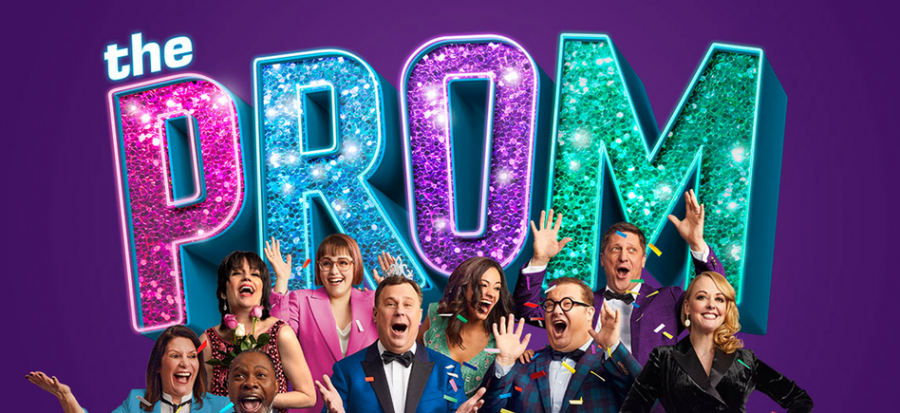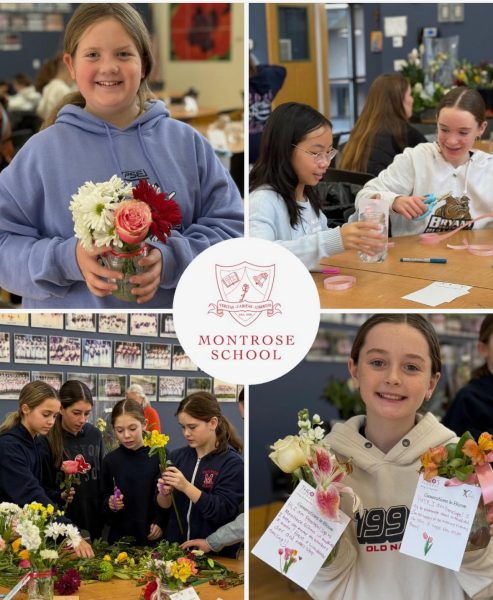The Prom
On Friday, December 11, Netflix released its much anticipated movie adaptation of the Tony-nominated Broadway musical The Prom. Ever since The Prom’s 2018 Broadway debut, there have been whispers of a film adaptation. Now, in the midst of a Broadway shutdown, Ryan Murphy brings us this uplifting love letter to Broadway that fills all theater kids with the rush of performance.The Prom was everything I want from a musical — I laughed, I cried, and most importantly, I immediately searched for the soundtrack on Spotify. While the movie adaptation and even the story itself is flawed, I think the message and extremely talented cast made this a perfectly enjoyable, feel good film.
The Prom follows high school senior Emma, whose Indiana public highschool decides to cancel their prom rather than let her attend with her girlfriend. When a handful of struggling Broadway stars look for a publicity opportunity to rehabilitate their reputations, and they hear Emma’s story, they decide to come to her school. While they are initially looking for publicity, they feel drawn to support Emma and to move the hearts and minds of her community toward acceptance and inclusion.
Aesthetic
One aspect of the film that makes it stand out among other movie musicals is how it really treats itself like a stage production. Whenever a song begins, it’s as if the characters are momentarily taken out of the real world and transported onto a stage. Theatrical lighting appears in the halls of the high school and reality is paused as the characters reveal their deepest emotions through song.
This over-the-top shift from film to stage matches the tone and bright aesthetic of the film. Many costumes and set pieces, particularly in the first and last scenes, are extremely bright and sparkly. I think it holds thematic significance, given when and how this color scheme is used. Contrasted with the far more realistic costumes and down to earth sets of the majority of the film, the brightness of the staged scenes are symbolic of the actors’ Broadway flair which they bring with them to Emma’s school. At first, the Broadway group faces rejection; but, by the end, the school embraces both Emma and the flashy colorful aesthetic Broadway cast.
Cast
One of the best parts of this film is the cast. This mostly star-studded cast includes Meryl Streep (the woman, the myth, the legend), Andrew Rannells, Nicole Kidman, Kerry Washington, James Corden and features some new faces such as Jo Ellen Pellman as Emma and Ariana DeBose as Alyssa. The entire cast shines, but for me, the highlight of the film was James Cordon. I was already a big fan of his; so, when I heard that he starred in this movie, I was fully expecting to laugh out loud — and I certainly was not disappointed. What I wasn’t expecting, though, was the raw emotions and acting prowess Cordon displays. When Barry reveals his estranged relationship with his parents due to his sexuality, and he openly sobs, it feels so real and raw. It took me by surprise given that up to that point his character was primarily comedic. Barry’s entire arc — finally getting to go to prom after 21 years and eventually reconciling with his mother — mixed with Cordon’s natural charm and charisma made Barry such a lovable character and a real stand out for me.
Many critics disagreed however, feeling that Cordon portrayed the character as more of a gay sterotype than a fully fleshed out character. Zach Sharf from IndieWire wrote: “That Barry wouldn’t rely on a dash of comedy to cope with his pain in the film’s most emotional emotions makes Corden’s performance ring false. The inconsistency means that Corden is playing off crass gay stereotype rather than sublimating them into his character.” I can see where people are coming from but, I tend to agree more with Jude Dry, who responded to Zach saying: “Like every other character in the show, Barry Glickman is a broad caricature. He’s written that way.” The character itself is a play on old stereotypes, so Cordon feeding into that stereotype seems to hold true to writing. Dry goes on to say that Cordon struck just the right balance between humor and emotion, and I couldn’t agree more. He delivered both hilarious one-liners and some truly heartbreaking and heartwarming scenes.
The Music:
The music in this movie is truly spectacular, mixing classic Broadway style with a more modern sound. It hits all the “musts” in a Broadway musical — from big glitzy showstoppers such as “It’s Not About Me” and “Tonight Belongs To You,” to quietly beautiful ballads like “Alyssa Greene,” “Dance With You,” and “Unruly Heart.” My top three favorites would have to be “Barry is Going to Prom,” “Love Thy Neighbor” (seriously, Andrew Rannels knows how to kill a comedic Broadway musical number better than anyone), and the finale number “It’s Time to Dance.” I think this finale number perfectly encapsulates the film’s message of inclusion with the lyrics:
“Build a prom for everyone
Show them all it can be done
If music blares and no one cares
Who your unruly heart loves
Build it now
Make people see how the world could one day be
It might come true if we take a chance
But ’til that day comes
I say cue the drums
It’s time to dance.”
The choreography throughout the movie is great. My only complaint with the musical performances is that the music itself often sounds heavily polished in the studio. We are missing that authenticity of a singer’s unedited voice that we get with live theater. Instead, the voices sound artificial; and it sometimes takes you out of the moment because of how obvious it is that the characters are lip synching.
Conclusion:
Overall, the movie is uplifting and fun, though a little overly simplified and idealistic. The community’s immediate change of heart by the end of the movie is a little too unrealistic (I mean, yes, I understand that this is a universe where characters break into choreographed musical numbers on the daily, so the film isn’t exactly aiming for realism). It’s certainly not all rosy; the film explores some real pain on the way to this Disney-esque ending. Alyssa, Emma, and Barry all struggle throughout the film with their families’ rejection of them, and I think their pain is presented honestly. In between upbeat, show-stopping numbers, these story arcs bring us some genuinely touching moments. Though the resolution is a little far-fetched, it’s in keeping with the tone of the film. The whole story is cheesy, goofy and stubbornly optimistic, much like the main character Emma. So yes, it’s an idealistic ending. But isn’t that what we love about musicals? They take us outside of ourselves, into a world where our problems can be solved by singing about them. I think The Prom is almost poking fun at that idea. Broadway has always been known to playfully mock itself, so Andrew Rannels singing to the mean kids at Emma’s school and changing their hearts in minds within a single musical number almost seems like self-aware mockery of cliche Broadway happy endings.
I think I, and many other Broadway fans, badly needed this movie. If we can’t see an actual live performance for a little while, this movie more than satisfied the itch we all have for a big, splashy, feel-good musical.
Lucy Stefani ‘21, Arts & Entertainment Editor











